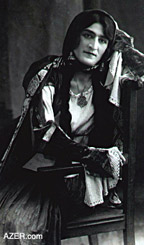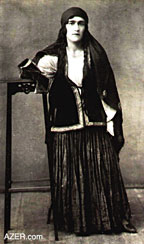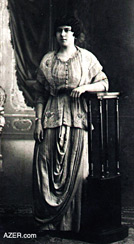|

Autumn 2004 (12.3)
Pages
48-52
Pre-Soviet Era
Growing Up in Baku's Old City
by
Khadija Aghabeyli
  Khadija
Kazimova Aghabeyli [1910-1989] grew up in the Ichari Shahar [pronounced
ee-char-EE sha-HAR], the Old City of Baku. Khadija was the grandmother
of medical historian Dr. Farid Alakbarov who discovered her diaries
when working on some old documents in the family's archives.
Their home was the beautiful three-storied Baroque-style mansion
that was demolished during the Soviet period in the 1970s to
make way to erect what came to be known as the Encyclopedia Building
which many people have since dubbed, "The Ugliest Building
in all of the Old City." Khadija
Kazimova Aghabeyli [1910-1989] grew up in the Ichari Shahar [pronounced
ee-char-EE sha-HAR], the Old City of Baku. Khadija was the grandmother
of medical historian Dr. Farid Alakbarov who discovered her diaries
when working on some old documents in the family's archives.
Their home was the beautiful three-storied Baroque-style mansion
that was demolished during the Soviet period in the 1970s to
make way to erect what came to be known as the Encyclopedia Building
which many people have since dubbed, "The Ugliest Building
in all of the Old City."
Khadija eventually succeeded in getting a medical degree despite
the many difficulties brought on when the Bolsheviks took control
of Baku in 1920 and her father, a businessman, could not return
to Azerbaijan from Germany where he was working.
These reflections
were penned towards the latter part of her life. As her grandson
observes: "Often the autobiography of an individual reflects
the biography of a country." Her diary covers much of the
Soviet period between 1920-1940.
We publish her reminiscences here as they provide a glimpse of
how some of the elite, wealthy members of Ichari Shahar lived
during the early part of the 20th century.
Although Khadija seemed to prefer writing Azeri in the Arabic
script which was the official alphabet until the late 1920s,
her memoirs here were penned in Russian, which by the middle
of the 20th century had become the prestigious language of Azerbaijan
as it was in other Soviet republics as well. She wanted to make
sure that her grandchildren would be able to read her memoirs
since so often grandchildren did not know the alphabet and language
of their grandparents.
During the 20th century, the alphabet had already changed three
times during her lifetime and so often the younger generations
were not able to read what their parents and grandparents had
written. Khadija did not hide her memoirs, but it would have
been dangerous to express such thoughts about the Oil Baron period
so openly during Stalin's regime and impossible to publish most
of the diary during the Soviet era.
The Ice Vendor
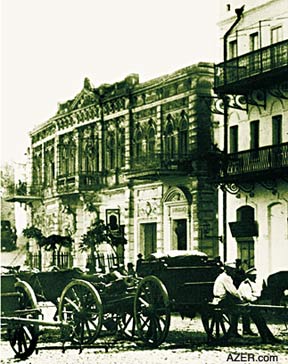  Left: This elegant Baroque style residence,
originally the "Most Beautiful Building in the Old City",
was dynamited and demolished in the 1950s during the Soviet period
only to be replaced by the Encyclopedia building or what the
residents of Baku deem, "The Ugliest Building in the Old
City". The original owner and builder was Gatir Haji Zeynalabdin
Taghiyev. Mammad Hanifa, who was living there at the time, was
the person who organized the residents of the Old City to successfully
resist the Bolshevik and Dashnak attack during the massacre of
March 1918. Note artillery on the carts in the foreground. Photo:
1918 just prior to Bolshevik attack. Courtesy: Farid Alakbarov Left: This elegant Baroque style residence,
originally the "Most Beautiful Building in the Old City",
was dynamited and demolished in the 1950s during the Soviet period
only to be replaced by the Encyclopedia building or what the
residents of Baku deem, "The Ugliest Building in the Old
City". The original owner and builder was Gatir Haji Zeynalabdin
Taghiyev. Mammad Hanifa, who was living there at the time, was
the person who organized the residents of the Old City to successfully
resist the Bolshevik and Dashnak attack during the massacre of
March 1918. Note artillery on the carts in the foreground. Photo:
1918 just prior to Bolshevik attack. Courtesy: Farid Alakbarov
I was born in 1910 in "Ichari Shahar" or the "Inner
City" which is the most ancient part of Baku. Despite the
fact that these lanes and narrow streets are relatively quiet,
we used to wake up in the mornings to hear the ice peddlers calling
out: "Ice! Ice! Buy ice at a cheap price!"
As there were no electric refrigerators in those days, people
bought ice blocks and stacked them in special wood boxes where
they kept perishable food. Instead of refrigerators, they had
to buy ice on a regular basis. Only rich people could afford
to do this, while the common people preferred to spend their
money buying small portions of meat, fish or milk on a daily
basis. Some fresh products like fresh meat coud be preserved
in refrigerators for a certain time, but such hot dishes as Bozbash
(meatball soup), Piti (lamb stew), Kabab, Dolma (stuffed grape
leaves), Jizbiz (fried liver, kidneys and other inner organs)
and Dushbara (meat dumplings) were traditionally only eaten fresh
while they were still hot.
It was against tradition to save food for the next day. For example,
I never saw my mother or my uncles or any other relatives, for
that matter, eating leftovers that had been prepared the day
before. To do so was considered a shame in our family and circle
of friends.
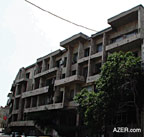  My grandfather
Gatir Haji Zeynalabdin was rather conservative by nature. He
didn't like tin cans or products stored in the refrigerator.
He was sure that Russians were "cold" and "frozen"
people because they ate frozen meals. For him, meat from tins
was for cats and dogs, not for human beings. My grandfather
Gatir Haji Zeynalabdin was rather conservative by nature. He
didn't like tin cans or products stored in the refrigerator.
He was sure that Russians were "cold" and "frozen"
people because they ate frozen meals. For him, meat from tins
was for cats and dogs, not for human beings.
My grandfather's house was always filled with guests. Sometimes,
hundreds of people were invited and dozens of types of dishes
were prepared. If, after completing a meal, some dishes remained
on the table and became cold, my grandfather usually ordered
them to be given to the servants. Scraps were thrown to the cats
and dogs.
No Leftovers
According to tradition in Ichari Shahar, if you invited guests
and prepared kabab for them, and if some of the best pieces of
kabab were not eaten and were left untouched, you could not store
them in the refrigerator and eat them the next day, you had to
offer them to poor people.
If you could not find any poor people, servants and beggars,
then tradition dictated that you throw the meat to the dogs.
It was not acceptible to throw any food into the garbage as it
was "Gunah"-a sin against God.
My uncle Mammad Hanifa loved to distribute cool dishes between
beggars and poor people who crowded in front of the doors of
his house. He considered offering them food to be his religious
duty.
Cold meat was only for the poor and beggars. You could insult
your guests if you offered them any food left over from the day
before even though you had stored it in the refrigerator and
carefully reheated it on the stove. This was especially true
if your guest were a high-ranking person. The guest would complain,
"I'm not a dog to eat yesterday's meal!" Then he would
leave and never return.
Camel Meat
People in Ichari Shahar loved so much to eat meat. My grandfather,
like many other people in the Inner City, preferred lamb. Veal
was rarely prepared, and pork was never eaten because we are
Muslims.
Selling camel meat in the Ichari Shahar was a traditional practice
though it happened less and less as the years went by. Sometimes,
traders would bring a camel to Ichari Shahar to sell. Usually,
it was decorated with different flowers and fabrics and looked
very beautiful. Sellers led the lone animal along the narrow
streets of the Inner City, calling out: "Hey, who will buy
my camel?"
It seemed the camels themselves were conscious that they were
about to be sold and slaughtered. They cried and you could see
tears in their eyes. It was a very strange and sad scene. In
the end, the camels were slaughtered and sold. The meat of camel
was considered a delicacy. People in Ichari Shahar loved gutabs
made of camel [camel meat wrapped and fried in a thin pastry
like a crepe]. However, in Baku camel meat was rarely eaten and,
thus, it was very expensive. Not many people could afford it.
Table Manners
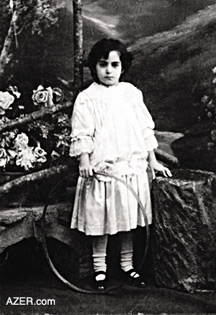  Left: Khadija Aghabeyli, the author, as a
child in formal studio photo. Early 1910s. Left: Khadija Aghabeyli, the author, as a
child in formal studio photo. Early 1910s.
Our parents used to carefully instruct us about table manners
and how to be very appropriate when we ate. We adopted both the
Eastern and European ways of eating. Bozbash [meatball soup]
was eaten with spoons, although pilaf [plov] and stuffed grape
leaves [dolma] were eaten with fingers. My grandfather was so
skillful in being able to pick up the grains of rice of the pilaf
with his three fingers without dropping a single grain.
My father and uncles ate their pilaf with spoons, following the
European traditions. According to traditions in the Inner City,
our parents made us refrain from eating too much or too fast
or from reaching across the table for any of the dishes. It was
also forbidden to take the last piece or portion of anything
from any of the main dishes.
If one of us kids broke any of these rules, our parents would
reprimand us: "Are you a Gormamish?" (meaning "someone
who has never seen such a thing in his life"). It was the
most offensive expression that they ever used with us.
Another expression that they used was "Pinti" [sloppy
person]. Once when my little brother Haji-Agha took a piece of
meat from the Bozbash and clumsily spilled some soup on his suit,
my mother hit him on the head and rebuked him angrily: "We
give you the best things, but you still remain 'Gormamish' and
'Pinti'-like a son of a barefooted person from the Outer City.
Get up and leave the table!"
Despite how wealthy our family was, we were brought up with strict
discipline and rather Spartan conditions. The first half of the
day we spent at school where we were obliged to wear a special
uniform just as soldiers do. During the second half of the day,
we did our homework and helped with routine tasks at home or
helped to look after house.
It was considered that a good wife should know everything about
housekeeping: she should be able to sew, weave carpets, cook
food and clean house. In addition, we had teachers for music
(piano) and other tutors, who came to our home to instruct us.
Sometimes, we went to visit friends or to the theater, usually
accompanied by our parents. Normally, they did not allow us to
walk in streets alone. They didn't give us very much pocket money
and we had no right to say anything against the will of our parents.
My father Alakbar Kazimov worked in Mainz (Germany). He was a
businessman and had a factory there. He wanted to take my mother
Sariyya there, too, but she didn't want to go. "I can't
go without my parents," she complained. "I can't leave
the Inner City where I grew up." So father lived and worked
in Mainz all by himself; but prior to the time when the Bolsheviks
took control of Baku [1920], he often returned to see mother
and me.
Grandfather
Above: Examples of European
attire worn by wealthy Azerbaijani women during the Oil
Baron era (1885-1920) prior to the Bolshevik invasion in Baku
in 1920. Ana Khanim Taghiyeva in 1932, daughter of Mammad Hanifa
Taghiyev (Khalida's cousin). Umleyla Ibrahimbeyova (Khadija's
aunt) in 1908.
My grandfather (mother's father), who died at quite an old age
in 1914, was a very famous person in Ichari Shahar. He had been
named after the millionaire and philanthropist Haji Zeynalabdin
Taghiyev (1823-1924) [who, to this day is respected as having
been the most philanthropic of all the Oil Barons]. My grandfather
constructed many buildings in Ichari Shahar. In 1873 he built
the gates in the fortress walls [adjacent to Sabir Garden]. He
was known as a very smart person; people had nicknamed him "Gatir"
Haji Zeynalabdin ["Gatir" means "mule", but
connotes cleverness.]
My grandfather owned many shops and stores in Baku and had some
land in Gala village. He had two large homes in Ichari Shahar-one
nearby the "Chain House" in the Inner City [where the
Encyclopedia Building now stands] and the other in modern Aziz
Aliyev Street [where the Yin-Yang Restaurant stands not far from
the Azerbaijan Cinema and Natavan statue]. Her grandfather's
house was constructed at a place where the fortress wall separated
the Inner City from the Outer City. The front of the house opened
to the Outer City, while the courtyard was located in the Inner
City.
An underground tunnel connected these two homes to each other.
When I was a child, I often walked along this way from one house
to the other with my mother. We even had electricity and lamps
along this underground path even though electricity was very
rare and expensive back in those days around 1912.
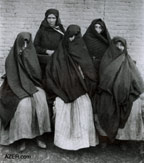  Left: Typical veiling of Azerbaijani Muslim
women prior to the Bolshevik Revolution. Left: Typical veiling of Azerbaijani Muslim
women prior to the Bolshevik Revolution.
My grandfather
was a traditionalist. He was convinced that Azerbaijanis must
only dress in the national costume. He hated European clothes.
He used to trim his beard and large moustache with meticulous
care, and he always wore the Azerbaijani national dress including
the "papag" [pointed hat]. The expensive highly decorative
dagger that he wore in his belt, which was made of silver and
gold, was also part of his national costume. Even when his sons
and daughters begged him to wear a black European suit to attend
the theater or other official venues, grandfather refused. And
with such a vengeance!
He was a very stubborn man, but people loved him anyway because
he organized charity feasts during the Muslim holidays. During
those days, the doors of his Baroque-style mansion in the Ichari
Shahar were always open. Anyone from the street could enter and
sit at a very long table and eat as much as he wanted. Dishes
were brought in and refilled by servants all day long. It wasn't
only my grandfather who made these feasts; many people in Ichari
Shahar organized such charity tables for the poor.
My grandfather liked horses and horseracing. He had a lot of
horses in his villa in Mardakan near Baku [a summer resort for
the wealthy on the Absheron Peninsula, not far from the sea].
He used to buy expensive Arabian horses and feed them French
chocolate. Once, a veterinarian told him that chocolate was bad
for their teeth, and so he stopped doing that and substituted
straw for the chocolate.
Father
In contrast to my grandfather, my father Alakbar was a modern
man. He graduated from Commercial College in Baku and was quite
educated. He knew several foreign languages including English,
German and French. His own father was a wealthy merchant from
"Bayir Shahar" (Outer City) and owned a number of carpet
shops on Aziz Aliyev Street, directly opposite the mansion belonging
to my grandfather.
Both of my grandfathers were friends, so it was not unusual at
all that their children-Alakbar and Sariyya-would end up marrying
each other. My father's family presented a dowry consisting of
a large gold plate filled with diamonds. Afterwards, my father
left for Germany on a long business trip. He established a factory
that produced Caucasian carpets in Mainz. He was very successful
in selling them to European markets, and they brought substantial
profit for our family. Unfortunately, my father antagonized my
mother's brother-Gochu Mammad Hanifa Taghiyev.
Gochu Mammad Hanifa
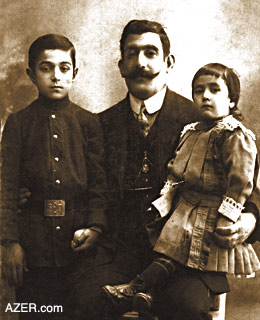  Uncle
Mammad Hanifa was a very famous person in the Inner City because
he had done the most to save Ichari Shahar from the Armenian
pogroms in 1918. Uncle had organized the armed resistance of
the local residents in the Inner City. Uncle
Mammad Hanifa was a very famous person in the Inner City because
he had done the most to save Ichari Shahar from the Armenian
pogroms in 1918. Uncle had organized the armed resistance of
the local residents in the Inner City.
Left: Mammad Hanifa Taghiyev
and his two children.Hanifa organized the residents of the Old
City to resist the Bolsheviks and Dashnaks massacre in 1918.
Many credit their lives to him. When Bolsheviks gained control
of Baku in 1920, they executed Hanifa.
People in Ichari Shahar still remember his name with deepest
respect and awe and say, "We're alive today only because
of Mammad Hanifa's efforts".
But Mammad Hanifa had a difficult character and, thus, he created
many enemies for himself. He wanted all the people in Ichari
Shahar to accept his leadership. My father often disagreed with
him. In contrast to my uncle, my father was very patient, well
brought up, calm, and even somewhat melancholic as a person.
My father's cool dignity used to enrage Mammad Hanifa. Once,
he shouted at my father: "I'll kill you!" Then father
took his revolver out of his pocket, offered it to Mammad Hanifa
and calmly said: "Take it and kill me if you dare!"
Uncle Hanifa stared at my father in rage, turned and stomped
out of the room.
In 1914, World War I broke out. Shortly afterwards, grandfather
Haji Zeynalabdin died. His great wealth was divided among his
children. The greatest portion of the wealth, including the steamship
company Volcano, became the property of Uncle Mammad Hanifa.
At first, Mammad Hanifa managed this business very well and even
developed the business by purchasing new German ships like the
Bremen Volcano. But then the business started to fail; he had
to sell a considerable part of grandfather's property, including
some of his mansions in the Inner City as well as some of his
villas.
About that time, Mammad Hanifa met a lovely Georgian woman and
moved in with her in a separate house, even though he had both
a Muslim wife and children in another house. It was a tradition
in those days for wealthy men in the Inner City to have two families-one
family with an Azerbaijani woman, which was his official family
and another wife, who was Russian or Georgian, in an unofficial
relationship.
During this period, my father continued to work in Germany, which
at that time happened to be at war with Russia. As Azerbaijan
was part of the Russian Empire, all routes between Germany and
Azerbaijan were severed. Father often wrote letters to my mother
and she would write him back. However, many of our relatives,
including my mother's brothers hated my father and used to tear
up his letters and trash them.
Under pressure, my mother was forced to divorce my father. In
1916, she remarried with her cousin Alizade, and I had to leave
my father's home and live with my aunt or, sometimes, with my
uncle for a certain period of time. Then mother took me back
home with her again.
When I was six years old, mother sent me to St. Nina's Russian
School for Girls, which was located on Nikolai Street [now Public
Schools No. 132 and 134 on Istiglaliyyat Street across from Baku's
City Hall]. We studied various subjects including foreign languages.
I became fluent in Russian and French.
Later, I went to Haji Zeynalabdin Taghiyev's Boarding School
for Muslim Girls, which during the Soviet times became known
as the 16th Soviet School named after the writer Husein Javid.
Both of these schools were famous. Daughters of many famous people
from Ichari Shahar and Bayir Shahar studied there. Many of them
were my friends such as Govhar Safaralizade (Safaraliyeva), Khadija
Kalantarli, Giz-Ana Rustamzade (Rustamova), Sara Akhundzade (Akhundova),
Sakina Akhundzade (Akhundova), Nughra Jafarzade (Jafarova) and
others.
In school, not only did girls study various sciences and languages,
but they also learned the art of housekeeping, sewing and drawing.
In 1921, I created an album where my classmates drew various
images, flowers and animals with watercolors and wrote poems
and verses devoted to me.
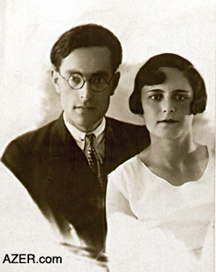  Left: The author: Khalida Aghabeyli with her
husband Aghakhan Aghabeyli in 1934. Left: The author: Khalida Aghabeyli with her
husband Aghakhan Aghabeyli in 1934.
I had
a very close schoolmate-Sara. We became friends when I was 9
years old (1919). Later, our parents became friends, too. Sara
had a cousin, a boy who studied and worked in Baku, who often
visited her. Once, we met at a Charity Evening organized by the
Oil Baron Haji Zeynalabdin Taghiyev to which our parents had
been invited. Later, this boy often visited us in our home together
with Sara.
He accompanied us when we went out for walks or were invited
by our friends and relatives. His name was Aghakhan. He was six
years older than me. It turned out that he had fallen in love
with me. However, he did not tell me anything about his feelings.
He was thinking: "Let her grow up; then I'll marry her"
(at least, that's what he told me years later when we married).
As you can guess, he became my future husband. When I was 15
years old, I also became very fond of him. I once sent him a
letter telling him that I loved him, too, but he didn't answer
me. Then, he disappeared for many years. We met again only in
the 1930s when we got married.
Bolsheviks in Baku
The Bolsheviks captured Azerbaijan in 1920. That's when they
came to our home in the Inner City and confiscated our furniture
and valuable things. They arrested and shot my mother's brother-Gochu
Mammad Hanifa Taghiyev because he was an Azerbaijani patriot
and had headed up the resistance against the Armenians [and Bolsheviks]
in 1918. We were barely able to escape only because my father's
brother Aghahusein Kazimov was a high-ranking Bolshevik and he
protected us. He was the Commissar (minister) of Health Care
in the Bolshevik government of Azerbaijan.
We were not arrested [unlike so many other wealthy people who
were imprisoned or executed] but our life became miserably poor.
My mother's attitude towards me got worse. She wanted me to find
a job at such an early age, and I was forced to work in a factory
that Mashadi Rustam owned. This factory continued to operate
even during the first years of the Bolshevik Revolution because
Communists declared New Economic Policy (NEP) allowing restricted
private business activities in Baku.
My father Alakbar wanted to help me, but it wasn't so easy. He
was not able to return to Baku legally as he was considered a
capitalist. The Bolsheviks would have immediately arrested and
shot him. Besides, his brother Aghahusein who still remained
in Baku was a commissar and he would have been discharged from
his post, arrested or exiled if Bolsheviks became suspicious
that he had "a brother who was a Capitalist".
Nevertheless, my father realized how hard my situation was and
sent me a letter from Germany. One of his relatives delivered
it to me. His note mentioned that on a certain date he would
secretly arrive on the shore near the Boulevard in a little motorboat
and would wait for me. I was to come and take a seat in this
boat and escape from Baku together with my father. He wrote me
that he already bought a house in the Anzali [Enzeli] in Iran,
where I would stay for a year studying German language under
the supervision of teachers. Later, he would take me to Germany.
At the appointed time, I gathered some essential private things
in a sack with the intention of walking down to the sea. But,
alas! My mother somehow figured out my plans and locked me in
the house. I beat on the door with all my strength and cried
out, but she would not open the door. My father waited for me
for a long time and then he left. He never tried to return to
Baku again. So, I remained here forever. My life would have been
so different if I had met my father that day.
Mother continued to tell me that I was old enough to earn money.
At first, I went to work in the factory of Mashadi Rustam, the
husband of my mother's sister. Then, in 1913, when I was only
13 years old, Mashadi Rustam took me to my uncle, the Health
Care Commissar and pleaded: "Give her a job. Let the girl
work. It would be so beneficial for her."
However, such
activities were not welcomed in the Soviet government when a
high-ranking person hired close relatives for his office. Therefore,
my uncle sent me to Commissar Samad Aghamalioghlu on the second
floor of the Government House and asked him to help me.
Aghamalioghlu said: "Sit down, my daughter and learn to
type. You will become a good typist in the future." And
so I typed texts all day long after returning from school, and
he gave me a monthly salary. That's how I came to work at the
Ministry of Agriculture.
Thus, I worked and, at the same time, studied at the 16th Soviet
School named after Husein Javid. I graduated in 1926 at age 16.
I wanted to become a physician. Therefore, I enrolled in the
Medical Faculty of Azerbaijan State University. I attended evening
classes at the university and worked as a typist during the day.
This continued for the four years of my university studies. Beginning
in the fifth year, I received a student stipend of 90 rubles
per month and, thus, was able to stop working. In 1930-31, I
graduated from the Curative Prophylactic Department of the University
and started to work as a physician. My first assignment was a
clinic of workers in the Gala district of Baku.
Dr. Khadija
Kazimova Aghabeyli worked there as a doctor in Gala from 1931-1934.
From 1939-1945, she was the head physician of the Children's
and Women's Consultation Clinic in Ganja, in north central Azerbaijan.
Later she was appointed Director of Ganja's Central Children's
Hospital. She gained such a reputation among families that they
called her, "The God of the Children".
During World War II (1941-1945), Khadija organized and supervised
the treatment of many wounded Azerbaijani soldiers and was awarded
the medals: "For Defense of the Caucasus" and "For
Victory Over Germany". She also received the medal, "Excellent
Health Care Worker". Her husband Professor Aghakhan Aghabeyli
(1904-1980) became a distinguished specialist in genetics and
developed two new buffalo cattle breeds-the Caucasian Buffalo
and the Azerbaijan Buffalo.
They had three children-Rena who has a Doctorate in Biological
Sciences and who is a specialist in Molecular Biology and Antioxidants;
Tahir who has Candidate Degree (First Level Doctorate) in Technical
Sciences and who is the inventor of agricultural equipment; Tagor
(died in 2002) who was an Engineer. During the Soviet period,
he was the Director of the Transcaucasian All-Union Institute
Of Tractors.
From Azerbaijan
International
(12.3) Autumn 2004.
© Azerbaijan International 2004. All rights reserved.
Back to Index AI 12.3 (Autumn
2004)
AI Home
| Search | Magazine
Choice
| Topics
| AI Store | Contact us
Other Web sites
created by Azerbaijan International
AZgallery.org | AZERI.org | HAJIBEYOV.com
|






